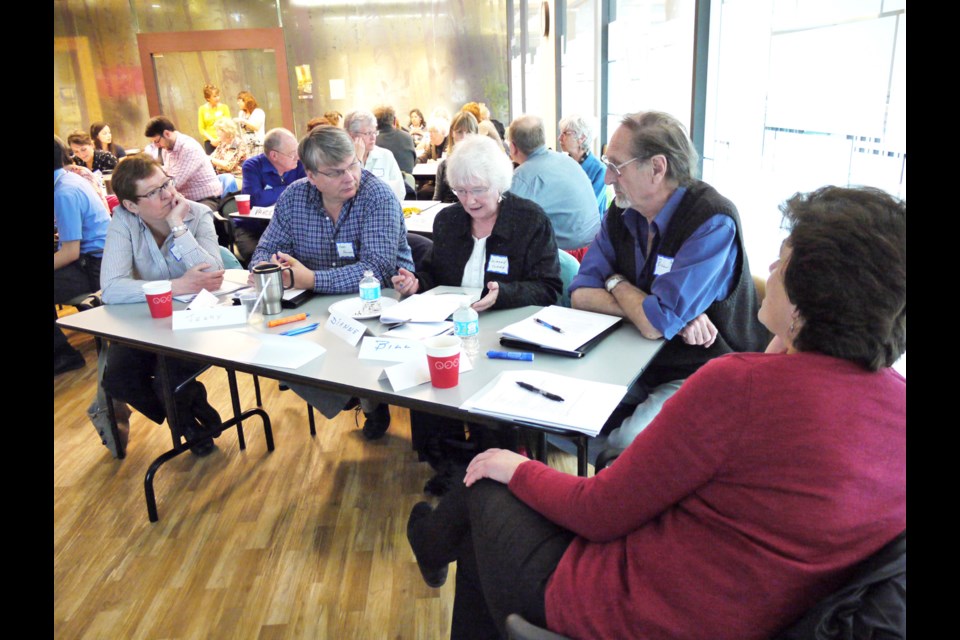Their kids might not want to hear it, their doctors might not have brought it up, but a group of New Westminster seniors is ready to start talking about what kind of medical care they want (and don’t want) if they ever get too sick to decide for themselves.
“My doctor has never discussed this with me. Maybe she’s not prepared to, but I will go and talk to her,” Patricia Redman told the Record.
“If they’re not ready to discuss it,” Dianne Clark said of her two daughters, “I need to write stuff down.”
Redman and Clark were part of an innovative new workshop on advance-care planning recently.
Sponsored by the Fraser Northwest Division of Family Practice to mark national Advance Care Planning Day on April 16, it brought together both seniors and family doctors to learn about planning ahead for their future care in case a severe illness ever renders them unable to make decisions for themselves.
It’s rare to see doctors and laypeople learning together, said co-facilitator Dr. Charlie Chen, a hospice and palliative care consultant for Royal Columbian Hospital and the New West community,
The content they need to know on most health-related topics is usually quite different, he said.
Not so with advance-care planning.
“It’s an activity that everybody should know how to do, even doctors for themselves,” Chen said. “We also believe that if doctors engage in the creation of their own advance-care planning, they’re going to be more able to facilitate advance-care planning for their patients.”
When patients don’t have a plan, the result is usually a lot of stress on relatives and doctors.
It’s a scenario Dr. Marianne Russell, who was at this month’s workshop, has dealt with many times.
A family doctor, who has worked as medical co-ordinator for a seniors’ residential care facility, she has seen how stressful it is for families to try to make decisions for loved ones who haven’t made plans for themselves.
“You’ll have family members that may have no idea what their relative wanted, and that’s a problem for the family member,” Russell said. “They feel an immense responsibility and sometimes guilt.”
When there is no family, that responsibility and guilt falls on doctors.
This month’s workshop was aimed at encouraging both patients and doctors to get conversations about advance-care planning started early.
That’s important, Chen said, because such conversations are complex and take time.
“The more we talk about these things with our patients, the more they have an opportunity to think about them,” he said. “Each successive health-care encounter allows the patient to understand more about what they want and for us to understand about what they want.”
There is also a financial argument to be made for advance care planning.
With clear instructions from patients not to pursue treatments like life support and feeding tubes if there is no chance of meaningful recovery, the health-care system stands to save money on patients who plan ahead.
But financial considerations are secondary to Chen.
“We can’t go into it thinking about the finances first,” he said. “I’m not an administrator, and I do recognize that there are fiscal constraints in our system, but that’s not my priority. My priority is to make sure that every patient receives the best care based on their values and goals.”
Having begun his own advance-care planning at age 38, the 44-year-old doctor said the process also pays off in terms of greater self-understanding long before health-care issues come into play.
“The first step of advance-care planning is reflection and understanding my own values and goals and priorities,” he said. “To engage in that process means that I get to learn about myself more deeply. And that’s the gift.”
Seniors at this month’s workshop found the same thing.
Clark said it’s be a process of figuring out what her beliefs are and figuring out what physical or mental ailment would make it impossible for her to want to live life.
“If I lose a faculty, can I compensate and still have a good quality of life, and which faculties would I be willing to lose?” she said. “It’s really hard to figure out.”
Having a chance to discuss such issues, especially among fellow seniors and doctors was helpful, she said.
So far Chen has received “overwhelmingly positive” feedback from both doctors and seniors about the workshop, which will serve as part of his work on a master’s of education at Simon Fraser University.
Making the workshops a regular thing or adding a level 2 workshop, however, will require more funding.
“If we’re able to prove to the purse-string holders that there is cost effectiveness and good bang for their buck, this might be repeated,” Chen said.



